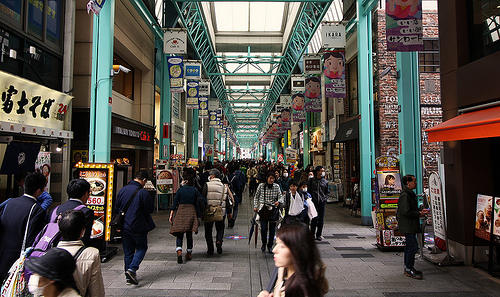Lesson 4 - Notes:
Shopping and repairs
(photo
by Blondinrikard Fröberg used
under terms of Creative Commons license.)

1. At
department stores (depāto) and
most other
stores in Japan,
neither tax exemption
nor discounts should be expected. Goods
sell precisely for
the marked amount. Of course, you
will frequently
find bargain counters
and sales at these stores,
but the reduced
prices are generally shown on tags.
There are
a few camera,
electronics, and jewelry
stores (mostly in the
Electronics District of
Tokyo) where
various discounts may be
available upon request.
If you've heard that
a particular store
gives discounts, you
might try asking sukoshi benkyō dekimasen ka?
meaning "could you
give me a discount?" But
if you aren't positive
that the store
gives discounts, it would
be better not
to ask.
2. In
cities and towns
throughtout Japan, you
will
find supermarkets (sūpā),
often
at or near
train stations. These supermarkets are
much like those
in the
Many sūpā
carry all
sorts
of goods, including
refrigerators and_clothing.
Therefore, the distinction
between depāto and sūpā
may
not, at times,
be clear. The
word depāto is apparently used for
long-established department
stores such
as Mitsukoshi, Takashimaya,
and Daimaru.
3. Some
unique features of
the Japanese
depāto
are
a. in
the basement (and
sometimes subbasement), rows of
specialty food shops,
which are independent
concessions;
b. on
a top floor,
a cafeteria or
eating place
serving Japanese
food as well as
Chinese and Western
foods;
c. on
another floor, cultural
exhibits (tenji-kai)
such as
ceramics, paintings, and
dolls. These exhibits change periodically;
d. on
the roof, a
playground (yūenchi)
and
a small
zoo (dōbutsu-en) for
chiIdren.
4. If
you have to
use
the restroom in a
depāto or
sūpā,
it may
be
marked with
the sign
"powder room" (keshō-shitsu) and
used by both
men and women. Once
inside, however, you will see
that there is a
partition dividing
the women's
and men's facilities.
Generally, there are both
Japanese-style and
American-style toilets
(toire), but don't expect
to find
toilet paper supplied.
Whenever
you go shopping,
it would be a
good idea to
carry a packet of
tissues, as the Japanese do.
5. In
stores allover Japan,
particularly in department stores, the
clerks are usually
careful to use
polite and
formal language.
To say "just
a minute, please,"
you, as
a customer,
would use the
expression chotto matte
kudasai.
A
typical salesclerk
might use the
more polite expression shōshō o-machi
kudasai.
6. Business hours of
some specialty shops
(mise)
may vary. Depāto,
sūpā and
most
mise are open
on Saturdays
and Sundays,_but
closed on one
of the weekdays.
You may
find one sūpā
closed every
Tuesday, while another
nearby sūpā
is closed
every Wednesday.
7. The word hai can usually be translated as "yes" or "that's right," but not always: For example, a Japanese may say hai as you talk to let you know he's listening intently. In such cases, you might think of the hai as a noncommittal "uh-huh." The hai doesn't mean that he agrees with what you are saying.